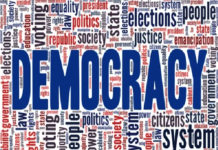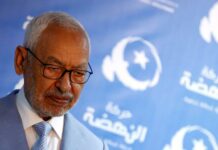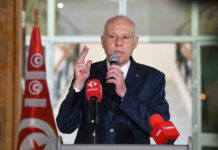June 3, 2021
By Lawyer and Political Analyst Shokri Azzouz
A free, independent, and sovereign state, with Islam as its religion, Arabic as its language and the Republic as its system. In these terms, Chapter One of the Tunisian Constitution of 2014 defines the Tunisian State, borrowing verbatim what came in Chapter One of the Constitution of June 01, 1959, adding to it the sentence “This chapter may not be amended.” Ostensibly, the content of the first chapter did not pose a problem and was not the subject of a significant debate between the founders of the 2014 constitution, just as it was in the case of the founders of the 1959 constitution. It was clear that revolutionary ecstasy made them inattentive to the nature of human-made texts that are subject, by virtue of their human upbringing, to the rule of development and the possibility of modification, no matter how complete they seemed in their time, and that only the heavenly texts are fixed and not subject to revision.
The provisions of Chapter One of the Tunisian Constitution pose problems of varying importance, both on the theoretical and on the practical level. However, the issue of state religion seems to us to be the most controversial. Can a country have a religion? What are the consequences of choosing a state religion and consecrating it at the level of constitutional texts on the functioning of its institutions? How is it possible to reconcile two contradictory attributes of the state: a state with a religion and at the same time a civil one based on citizenship, explicitly in Chapter Two of the 2014 Constitution? Is it possible for a state to adopt a republican system whose first principles are equality between all citizens and, on the other hand, to officially adopt the orientations of one part of them and not another?
Theoretically, the debate on the issue of state religion is usually linked to an endless debate about identity, culture, history and other issues that civilization and revolutions of mind have settled centuries ago… Philosophers and legal scholars have made an innumerable number of contributions to the definition of the modern state, all of which are unanimously agreed that it is first and foremost an institution and that this institution is by its nature distinguished by its permanence and independence from the human groups that reside in its territory and abide by its laws and subject to its authority. One of the manifestations of the state’s distinction is that it is not as religious as the humans who oversee its management, and therefore its religiosity cannot be translated into any behavior or rituals as they are.
We are facing a concept of the state that is difficult to comprehend in an intellectual and social system that rejects conception and abstraction and replaces them with simple diagnosis. The question about the meaning of state religion increases if we move the debate to the practical level in which the Declaration of Principles moves to the field of daily social and political practices. At that time, we find ourselves in front of a constitution with fluctuating trends, and it is difficult to resolve the conflict that characterizes many of its provisions.
Chapter VI of the 2014 constitution states that the state “sponsors religion, guarantees freedom of belief and conscience and the practice of religious rites, and guarantees the neutrality of mosques and places of worship from partisan recruitment.” On an initial reading, this chapter appears to be devoted to freedom of conscience and belief, and to protect the beliefs of each individual, whether religious or otherwise. However, its wording suggests the exact opposite. The term “sponsor of religion” came using the singular defined, which suggests that the religion in the state constitution is known and one, and there is no need to clarify whether it is an Islamic, Christian, Jewish or other religion. There are many problems raised by this chapter, and not the last of them is this systematic discrimination between the citizens of the state on religious grounds.
We find this distinction enshrined more clearly in Chapter 74 of the Constitution relating to the conditions that must be met for candidacy for the post of President of the Republic, as it explicitly states that a candidate must have the religion of Islam.
Referring to the deliberations of the National Constituent Assembly on this chapter, we do not find a convincing explanation for this stipulation that would limit the voter’s right to free choice. With more reflection, the phrases of Article 74 seem more dangerous than mere infringement of the right to free elections, as it would implicitly deprive every non-Muslim Tunisian citizen of the candidacy, and therefore contradicts what came in Article 21 that male and female citizens are “equal in rights and duties, and they are both before the law without discrimination. In parallel reading between the two chapters, we can dare to say that the Tunisian constitution presents religious affiliation as a condition of citizenship, and as a result does not consider non-religious Tunisians or those belonging to a religion other than Islam among the citizens.
In fact, the overlap between the religious factor and the requirements of the civil state is not limited to the text of the constitution, but we find it enshrined sometimes implicitly and sometimes explicitly in many legislative texts, especially those related to the public office, which enshrine the principle of equality shows all employees and all candidates for the exercise of public office. Examples of this can be mentioned those related to public jobs of a religious nature (preachers and imams, for example) whose practice by non-Muslim public officials is difficult to imagine, or jobs whose exercise requires the performance of an oath in a manner that clearly refers to Islamic teachings.
However, no matter how numerous and continuous the ambiguities in the relationship between the state and religion are over time, we must not forget that this situation is only the result of a historical ambiguity in concepts. We need to agree first on a rational constitutional definition of the state and drawing clear boundaries for its relationship with the human group in which it lives.











